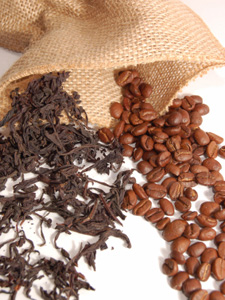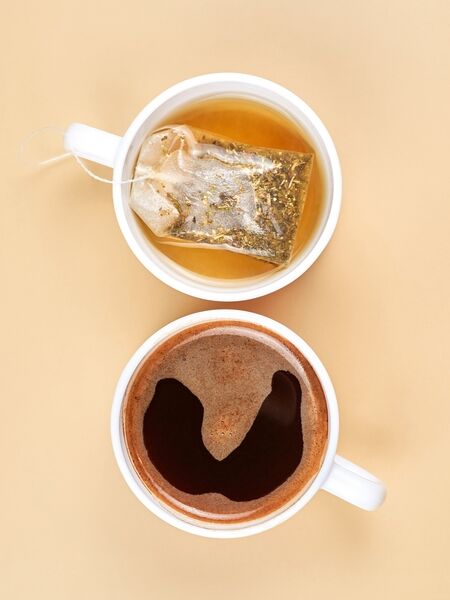Tea vs Coffee: The battle for the cup


Can't we all just get along?
There seems to be a general rivalry that has developed and perpetuates between the worlds of coffee and tea. This seems somewhat logical, considering they are both usually served after meals, both usually share the same supermarket space, and both are developing gourmet markets from more commercial pasts.
Such tight competition is sure to bring animosities. To win the market, these industries have tried their hardest to put as much distance between each other as possible. Coffee often touts its ability to energize, while characterizing tea as a drink for the sick. Tea, on the other hand, boasts amazing health benefits, while painting Coffee as a stomach-destroying poison. In this next lesson, though, we'll put aside our differences and discuss the similarities between the two hottest drinks available.
We'll begin at the most logical place: their origins. Both Coffee and Tea have legendary pasts. Tea, as discussed in a previous course, was discovered by the ancient Chinese ruler Shen Nung, when a fateful leaf fell into his boiling water. The similarly serendipitous story of Coffee dates back to late in the first millennium, when an Ethiopian goat herder named Kaldi noticed that his goats began to act unusually frisky after eating berries from an unfamiliar plant (coffee "beans" are actually seeds from coffee fruit). Curious, Kaldi picked one of the berries and popped it in his mouth. Full of energy and zest, he told of his discovery of this tree to local townspeople, and coffee's fame soon spread.
Amazingly, the history of the two followed nearly identical paths. Coffee and tea were introduced to England within seven years of each other. Both were first enjoyed under the reign of Charles II (nicknamed "Milk and Sugar Charlie" for his fondness for these additions to both the drinks). In 1652, the first coffeehouse opened in England - the same year the first tea samples arrived to the country. Tea, however, became the favorite due to the fact that it was easier to make.
Now, let's examine the two scientifically. Both Tea and Coffee plants are members of the evergreen family. If allowed to grow naturally, both will become trees. However, both plants are pruned so they can be easily harvested (tea is kept much shorter than coffee). Both plants produce a drink whose flavor is influenced by the growing conditions, such as soil condition, moisture, surrounding vegetation, etc. Both Coffee and Tea have been naturally imparted with a chemical that provides stimulation, caffeine. Finally, both use very similar methods of preparation.
In the U.S., coffee is the #1 hot drink. This title was usurped from tea relatively recently, following the explosion of coffeehouses, led primarily by Starbucks. Forty years ago, when all that was widely available was low-grade, instant coffee, the market was relatively equal. Slowly but surely, several pioneering coffee roasters in the late 60's and early 70's started spreading a simple message to Americans: "you need to be drinking better coffee. Really now, people. This is just sad." These roasters were able to educate consumers that something better was available and accessible. Now, thanks to growing and tight-knit online tea communities and courses such as TeaClass, a similar tea education may be able to even the playing field.
It is important to note that, worldwide, tea is still the #1 hot drink. We don't say this from a competitive standpoint, but from an educational one. In light of the similarities we've just highlighted, we will suppress the urge to end this with a "tea is better" bias. As passionate as we are about how the superiority of tea, there are coffee lovers out there who are equally fanatical. In the end, it's a matter of preference.
Whatever drink you may prefer, make sure you choose based on quality. Both industries have been marred by their respective stale, instant, convenience-driven muck. By supporting purveyors who are striving for quality, you'll raise the bar for the trade as a whole.
 teaclass
teaclass
